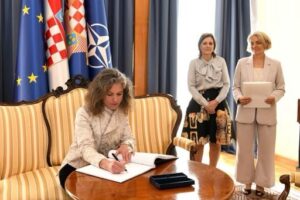There are approximately 50 Swedish companies in Croatia with 10,000 people in a wide array of industries.
Sweden and Croatia have a long history of bilateral relations shaped through official ties, extensive people-to-people contacts and Swedish business presence here in Croatia, for Diplomacy&Commerce magazine says H. E. Anna Boda, Ambassador of the Kingdom of Sweden to Croatia. This means that we are, on a daily basis, working together to solve both small and big issues that affect our citizens, societies and businesses, says H. E. Anna Boda.

Where do you see room for improving cooperation and are there any open issues between the two countries?
We are currently facing a very serious security situation in Europe due to Russia‘s full-scale invasion of Ukraine. We also see a rise in global geopolitical tensions and challenges posed by climate change. All these threats will be with us for a foreseeable future. They carry serious implications for the security and prosperity of our societies. In times like these, we need our partners and allies even more. I believe that together, Sweden and Croatia, can contribute to strengthening the resilience of our countries and of Europe. As a priority, we must continue our steadfast support for Ukraine. This is a major task for our generation and the future. Ukraine is fighting not only for their, but also for our freedom. Sweden appreciates Croatia’s committed support to Ukraine, manifested for example through hosting the International Donors Conference on de-mining last year. Looking ahead we need to strengthen the EU’s economic base. Promoting and facilitating trade and business is key for the EU to be competitive. For this, a well-functioning single market is necessary. Here, Sweden sees great potential to work with Croatia, both in the EU and bilaterally. Both our economies rely on trade, on being innovative, sustainable, and open for business. A recent example is increased cooperation between Croatia and Sweden in the health care sector, where EU funds are also providing opportunities. The Swedish company Elekta will soon be supplying Croatian hospitals with 12 high-tech linear accelerators to treat cancer patients. These stateof- the-art machines will contribute to the Croatian national plan to fight cancer and to care for patients. There are a number of Swedish companies, such as Astra Zeneca, Essity, Gettinge, Molnlycke and SOBI that are active on the Croatian market in the health care segment.
How do you evaluate the economic relations between the two countries? What do the numbers show (imports, exports, investments…)? To what extent is this process two-way and how much do Croatian companies invest in Sweden?
Economic relations between Sweden and Croatia are very good and have been continuously expanding over the past decades. Currently, there are approximately 50 Swedish companies in Croatia with 10,000 people in a wide array of industries. Our companies are present in ICT and gaming industries, beauty, and cosmetics, retail, energy, transport, tourism, wood industry and infrastructure, just to name some.We have seen big investments from Sweden over the years, from the privatization of Ericsson Nikola Tesla in the 1990’s to the more recent acquisitions of Nanobit by Stillfront, or the takeover of Spin Vallis by Vällinge Group / Bjelin. Over the years there have been many more examples, including IKEA, Foreo, Securitas, and Testament Winery that have all contributed to a total net investment of almost € 700 million over the past 30 years. Croatian investments and operations in Sweden, are more in the domain of the Croatian institutions, but I know that companies like Koncar and Dalekovod have been operating successfully on our market for years, and excellent Croatian products such as wine and food are exported to Sweden. Furthermore, more than 200,000 Swedish tourists visited Croatia last year and we see that the numbers are again approaching 300,000 tourists like before pandemic. As of May, direct flights will again operate between Stockholm and Zagreb, which will facilitate even closer exchanges between our capitals. This is in addition to regular seasonal flights to different Croatian cities.
Where do you see Europe and the EU in 10 years and what are the biggest challenges facing Europe that can threaten our values, way of life…? What are the biggest challenges?
The complex interconnected and global challenges, such as climate change, migration and Russia’s war against Ukraine have had a profound impact within and beyond the borders of the EU. These developments serve to underscore the quintessential need for even stronger co-operation at EU level. A strong and united EU gives Europe power and gives countries like Sweden and Croatia a voice on global issues. Looking ahead, the EU and its member states, will also need to consolidate our role as a security and defence policy actor and take greater responsibility for our own security. This includes strengthening civil defence, resilience, and preparedness as well as Europe’s defence industrial capabilities. The threats we face are increasingly complex. Sweden has, like many other countries, faced numerous malign information influence campaigns aiming to harm us. My government has been working for some time to prevent and avert the spread of disinformation, including through the re-established Agency for Psychological Defence. The agency contributes to strengthen resilience within our population and in our authorities by analysing information and by openly communicating about potential threats. As EU, we must also prepare for enlargement, it is a geostrategic investment in peace, security, stability, and prosperity. Apart from addressing necessary internal reforms, we need to focus on boosting EU’s competitiveness, an effective implementation of the migration package and continued fight against crossborder organised crime. We also need to safeguard what we have achieved with regard to core values such as democracy, rule of law, and take the lead towards a carbon neutral world and foster sustainable development that includes all EU citizens. Here, implementing the climate package – Fit for 55 – is needed to enhance the green transition. In parallel we need to set targets for 2040 that sets us on a credible path towards climate neutrality, in line with the best available science and with Paris Agreement. The EU is an amazing and unique example of cooperation between states. In a couple of months 370 million European citizens will simultaneously participate in elections to the European parliament. A day doesn’t pass without us all living in this union receiving the benefits that our cooperation provides, and not a day passes without me, as a diplomat, working to further our common European project. I truly believe that we will, in ten years’ time, see a stronger, safer, greener, bigger, and more competitive EU.

How does official Stockholm view EU enlargement? In addition to the countries of the Western Balkans, there is also Ukraine and Moldova?
EU enlargement is a geostrategic investment in peace, democracy, security, stability, and prosperity. Russia’s full-scale invasion of Ukraine has renewed the momentum for EU enlargement. Sweden welcomes the recent decisions to open accession negotiations with Ukraine, Moldova and with Bosnia and Hercegovina. It is in our interest to help the candidate countries to move closer to the Union. Membership negotiations are based on the candidate countries’ merits and on the implementation of necessary reforms, not least with regard to the rule of law and democracy. Sweden also supports all the candidate countries with long-term development cooperation to help them prepare for membership.
What does your recent NATO membership mean for Sweden and NATO?
Sweden is now a member of NATO, the defence community of Western democracies. After more than 200 years of military non-alignment, this is a historic step for us. It is also a very natural step. We have been cooperating as close partners with NATO since the 1990s. With Sweden in NATO, we will be safer, and NATO will be stronger. Developments in our neighbourhood will be more predictable and our neighbours will be more secure. With Sweden’s accession now complete, all Baltic Sea countries – except Russia – are members of both EU and NATO. And all Nordic and Baltic countries are members of NATO. Sweden will contribute with our unique capabilities and modern defense on land, in the air and at sea. We are also strengthening our defence and our defence budget to meet the NATO standard of 2% of GDP. Looking ahead, Sweden will continue to build security together with others as a loyal member of NATO and the EU, including Croatia, aiming to enhance security and stability in our neighbourhood and throughout the Euro-Atlantic area.

How would you rate the cultural cooperation between the two countries? You invest a lot in connecting when we talk about culture, education…?
Cultural and people-to-people ties are very important in connecting countries and societies. We have fantastic local partners in Croatia, ranging from institutions, civil society and the academic community to the business sector. This year the University of Humanities and Social Sciences in Zagreb marks 40 years since the arrival of the first Swedish lector that Sweden is funding, and I am very happy that studying the Swedish language is popular among students. Language provides a crucial entry point to any society. Our embassy supports numerous projects annually, such as First Generation, Festival of Fathers, Midsommar, Media Literacy Week, Saint Lucia, Croatian – Swedish Innovation Initiative, Greencajt. We have brought exhibitions on Astrid Lindgren, Nordic Glass, Women in the Viking Age, Nordic design, Bergman and we supported visits of authors such as Jonas Hassen Khemiri, Carl-Johan Vallgren, David Lagercrantz, Jens Lapidus. I had the pleasure to see one of the four Swedish films that were screened at ZagrebDOX and it was such a joy to share the immersive experience with a fully booked cinema. This spring, Malmö hosted the biggest music event of the year, Eurovision. Sweden’s first Eurovision victory was in 1974 when ABBA won with “Waterloo”. Thanks to that Sweden gained worldwide success and paved the way to become the third largest music exporter in the world.
